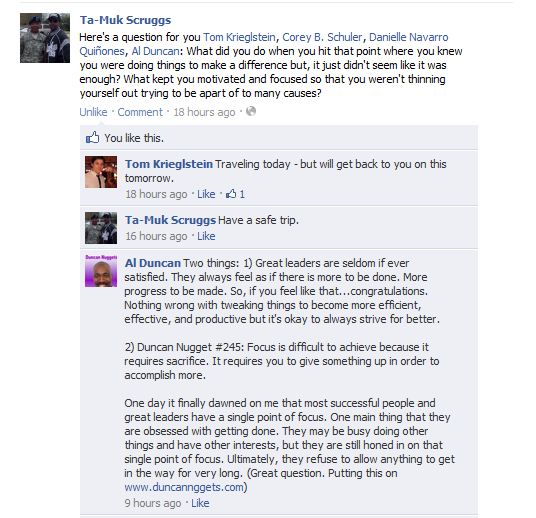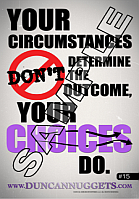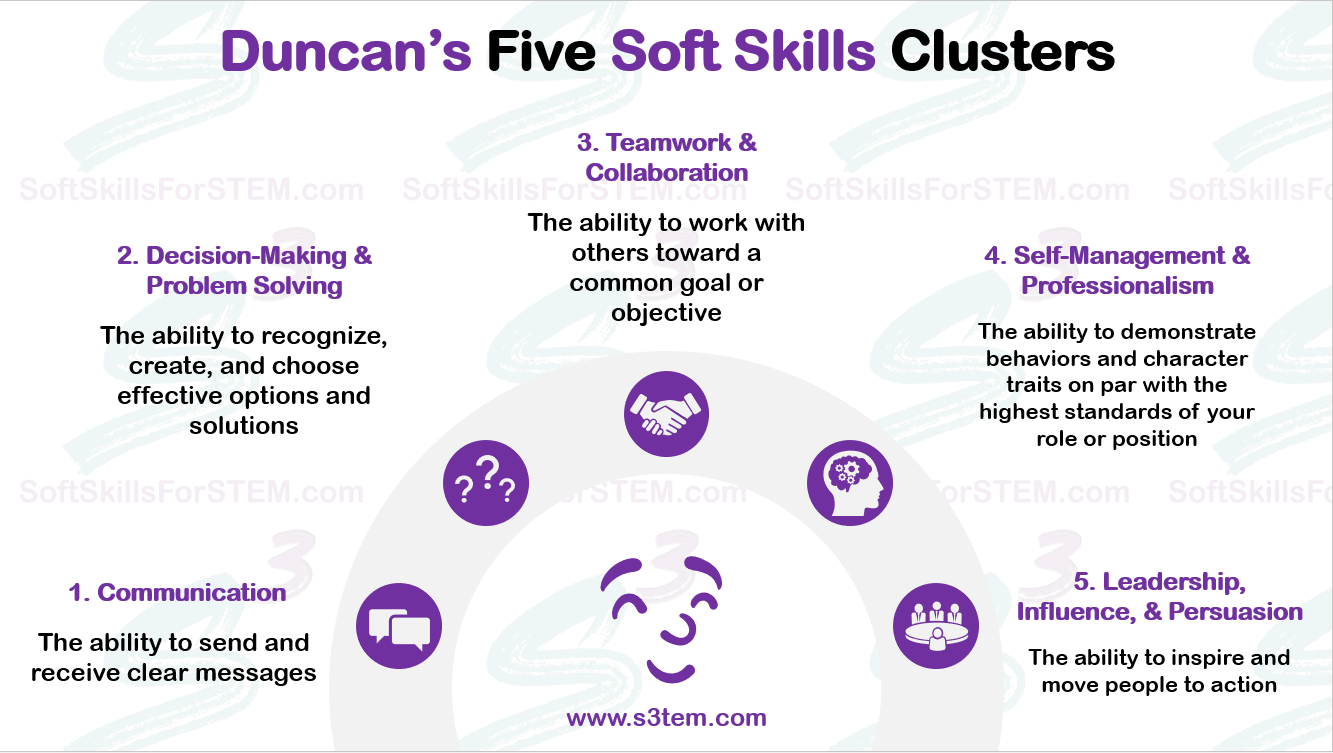[VIDEO] Duncan Nugget® #42: The Coffee Bean
If people experience the exact same thing, why do they have different versions of reality?
I’ll show you.
Initially, a coffee bean is green. Once harvested and roasted, it turns brown.
Next, someone grinds up some beans, puts the coffee grounds in a filter, runs hot water over them, and voila!—countless variations of coffee—cappucino, frappacino, black, or whatever—a perfect cup of coffee for whomever is drinking it.
Can anyone re-create the original coffee bean?
Of course not! Communication and reality work the same way.
You process reality through filters like your beliefs, values, and moods. You distort, delete, and generalize information to create the perfect cup of reality for you. Think about that.
Exceptional communicators learn to understand the filters that people use.
Million-Dollar Question:
When it comes to communication, can you take a coffee bean and make the perfect cup of coffee for you AND for others?
DISCUSSION QUESTIONS
1. Think about a time when you and someone experience the same thing, but both of you felt differently about what happened? Describe the situation. What factors—such as personality, experience, culture, emotions, etc.—caused you to see things differently?
2. Have you ever said something to someone that he or she took the wrong way? What happened? What factors caused the misunderstanding? What, if anything, will you do differently in the future?
3. What are 3 questions you can ask someone to make sure that you understand exactly what he or she is saying? Do you actually use these questions when you are communicating with people? If yes, provide an example. If not, how will you remember to use them in the future?
- Topics: Communication SkillsDuncan NuggetsPersonal DevelopmentProfessionalSoft SkillsTeenVideosYoung Adult
[VIDEO] Duncan Nugget® #281: Bogeys & Birdies
Economists at the University of Pennsylvania analyzed 2.5 million golf putts. (You know the game, right? If given four strokes to get the ball in the hole, but you do it in 5, that’s a bogey. Not good. You took too many shots. If you do it in 3 strokes, that’s a birdie. Awesome.)
The analysis showed that golfers concentrated and performed better when playing to avoid bogeys versus playing for birdies. Think about that.
It shows that people tend to be more motivated by fear of loss than desire for gain.
It works the same way in life:
“All of my bills are paid. That’s good enough.”
“I passed the test. That’s good enough.”
Not cool.
That’s doing just enough to get by and avoid a loss.
Million-Dollar Question:
In the game of life, are you playing to avoid a bogey (loss) or get a birdie (something exceptional)?
_____________________
DISCUSSION QUESTIONS
1. Think about the last time you challenged yourself. What were you doing? What made it a challenge? What was the outcome and what lessons did you learn? How are you using those lessons now?
2. Do you think that risk-taking is an important part of success? Why or why not?
3. If you had to take a risk on learning something new that could be embarrassing if you mess it up, how would you handle the situation? Has something like happend to you before? What did you do about it?
4. Do you think it’s better to take an easy class and get an “A” or take a challenging class where you might get a “C”? Explain how you came to this decision.
5. If you were 100% guaranteed to succeed, what is one thing you would challenge yourself to do? What would it take to be successful at this challenge? What are 3 things you can do to begin to build the skills and acquire the necessary resources to get it done?
- Topics: Character DevelopmentDuncan NuggetsGoals & ProductivityPersonal DevelopmentProfessionalTeenVideosYoung Adult
[VIDEO] Duncan Nugget® #179: Old Excuses
New year.
Old excuses.
Man…it seems like some people are just destined to be LAME.
Million-Dollar Question:[break]Are you still making the same old excuses[break]in a new year?
- Topics: Character DevelopmentDuncan NuggetsGrit, Perseverance, DiligencePersonal DevelopmentProfessionalSelf-Awareness & PurposeTeenVideosYoung Adult
[VIDEO] Duncan Nugget® #149: The Aspects Of What You Expect To Accomplish
Recently, a friend of mine gave up on his business.
“Al, I wasn’t prepared for the financial aspect of running a business.”
He’s not alone. Many people fail to reach their goals because they lack understanding about aspects of what they are trying to accomplish.
Plenty of great musicians have been taken advantage of because they didn’t understand the business aspect of the industry. There are leaders who expect to be successful, but become demotivated because they weren’t prepared for challenging aspects of leadership.
Regardless of what you expect, ask yourself questions like: What do I have to sacrifice? Time? Money? What problems could arise? What additional knowledge and resources do I need?
Answers to those types of questions will help you to master the aspects of what you expect to accomplish.
Million-Dollar Question:
How well are you prepared for the various aspects of what you expect to accomplish?
- Topics: Character DevelopmentDuncan NuggetsGrit, Perseverance, DiligencePersonal DevelopmentProfessionalTeenVideosYoung Adult
[VIDEO] Duncan Nugget® #190: Fire Hazards And Flammable Material
People spend way too much time putting out fires in their lives. I’m talking about preventable, avoidable problems that end up becoming a raging inferno of destruction in your life.
It makes no sense.
If you want to spend less time putting out fires then get rid of the fire hazards and flammable material in your life.
If all of your friends are idiots…duh! That’s a serious fire hazard.
Spending money you don’t have, procrastination, and other bad habits like those are flammable materials. They can cause your dreams and opportunities to go up in smoke.
If you spend a little more time getting rid of the fire hazards in your life and keeping flammable material away from your goals and aspirations, you’ll spend less time putting out fires.
Million-Dollar Question:
How soon are you going to remove the fire hazards and flammable materials in your life?
DISCUSSION QUESTIONS
1. What are the top 3-5 little problems that become big problems because people don’t take care of them right away?
2. What steps do YOU take (or should you take) to prevent little issues and bad habits from becoming major problems in your life?
3. What you do when a person is the problem in your life? What would you suggest to a friend who was trying to keep “people” problems from messing up his or her life?
- Topics: Character DevelopmentDuncan NuggetsGrit, Perseverance, DiligencePersonal DevelopmentProfessionalTeenVideosYoung Adult
[VIDEO] Duncan Nugget® #197: Protecting Your Momentum
There are few things harder than starting.
Starting what?
Anything that is a worthwhile endeavor.
It takes a lot of energy to get started. The Space Shuttle uses the most fuel during take off. Your car uses the most battery power when it’s starting up. Think about that. It recharges when it’s running.
Getting started in school or starting a new job, exercise program or business, is challenging because you’re creating momentum and fighting inertia: the natural tendency of an object to resist a change in motion.
Be careful. It’s the start-up phase that breaks a lot people. But not you, right?
You want to take at least one action step, daily, that will help you build and protect your momentum because one thing that’s harder than starting is starting over.
Million-Dollar Question:
What are you committed to doing to
build and protect your momentum?
DISCUSSION QUESTIONS
1. Have you (or someone you know) ever been doing really well at something and then just stopped working on it? What happened? If it could be done all over, what would you do or suggest the person does differently? How will you use this knowledge in your future endeavors?
2. In your opinion, what are the 3 main reasons people have a hard time getting started on their goals? Have any of those things ever affected you? How? What did you do about it?
- Topics: Character DevelopmentDuncan NuggetsGoals & ProductivityPersonal DevelopmentProfessionalTeenVideosYoung Adult
[VIDEO] Duncan Nugget® #245: Single Point Of Focus
“Here’s a question for you… What did you do when you hit that point where you knew you were doing things to make a difference but, it just didn’t seem like it was enough? What kept you motivated and focused so that you weren’t thinning yourself out trying to be apart of to many causes?”
Two things:
1. Great leaders are seldom, if ever, satisfied. They are always tweaking things to become more efficient, effective, and productive. They are always striving to do better. They always feel as if there is more to be done. More progress to be made. So, if you feel like that…congratulations.
2.
Duncan Nugget #245:
Focus is difficult to achieve because it requires sacrifice. It requires you to give something up in order to accomplish more.
One day it finally dawned on me that most successful people and great leaders have a single point of focus—one main thing that they are obsessed with getting done. They may be busy doing other things and have other interests, but they are still honed in on that single point of focus. Ultimately, they refuse to allow anything to get in the way.
Million-Dollar Question:[break]What’s your single point of focus?
_____________
[I was asked this question via the National Society of Leadership and Success Facebook page.]








